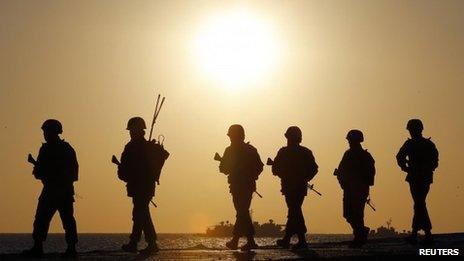Anxiety in South as N Korea rhetoric escalates
- Published

North Korea knows how to make headlines.
Over the past week, newspapers here in the South have turned Pyongyang's threats into front-page spreads: its promises of "pre-emptive nuclear strikes", "all-out war" and withdrawal from the 60-year-old Armistice Agreement that ended the Korean War.
South Koreans normally approach these kinds of declarations with a weary stoicism, barely pausing over their cappuccinos as they absorb the latest threats from their neighbour.
This time, though, the atmosphere here in Seoul is a little more anxious. While some dismiss it as just more of Pyongyang's bluster, others are worried by the volume and tone of the latest proclamations.
That goes for older South Koreans, in particular, say some.
"Young Koreans are very desensitized," one friend told me. "If it enters their heads at all, it dissipates very quickly, replaced with the latest celebrity (gossip). But the older generation do feel differently on security issues."
"I didn't care about this issue until now," said another. "But I do worry this time around. The young North Korean leader is not strong, and I don't trust the new government here in the South."
Even South Korea's Unification Ministry admits the mood has shifted. "Overall, there's a heightened sense of alert this time," a spokeswoman said.
Not just because of the "more belligerent rhetoric" coming from Pyongyang, but because of the actions accompanying them.
North Korea's launch of a long-range rocket in December, its apparently successful nuclear test in February and the fresh UN sanctions imposed on it this month have all added to the sense of tension on the peninsula.
Joint military exercises taking place here this month between the US and South Korean forces have also antagonised the North, just as they do every year.
The secretive communist state is due to begin its own large-scale military drills this week.
Few people here are expecting full-blown war, but in the current climate, there is concern over accidental escalation, especially after North Korea's decision to cut the military hot-line between the two sides at Panmunjom.
Even this though is not unprecedented. The telephone line at Panmunjom has been abandoned by the North before, most recently in 2010.
The year before that, it also announced its withdrawal from all joint agreements involving the South. And analysts point out that an alternative military communications line, used to monitor cross-border workers at the Kaesong Industrial Complex, remains open.
"I'm not so worried," another Korean friend told me. "Even though they have cut the hotline, I see their rhetoric as a plea for direct negotiations with the US."
Talking tough
But alongside Pyongyang's increasingly shrill denunciations, South Koreans are hearing some strong language from their own government too.
The country's new president, Park Geun-hye, who was sworn into office just two weeks ago, has vowed to respond strongly to any provocation.
Her government has said it will target not only the source of any attack, but also the North's top command.
That tough stance, while worrying to some, is likely to be a kind of "pre-emptive rhetorical deterrence", according to analysts such as John Delury, a professor of International Studies at Seoul's Yonsei University.
The idea that strong words could act as a deterrent to North Korean actions has gained traction since the lethal shelling of South Korea's Yeonpyeong Island in 2010.
As a government, Prof Delury says: "You're always fighting the last battle, and the last battle for South Korea was Yeonpyeong. The perception then was that North Korea had got away with shelling the island."
By talking tough, he believes Park Geun-hye wants to avoid any initial attack by the North.
But, he said, "some South Koreans are worried that the wrong lessons have been learned, and that if something small happens, it could escalate because the South Korean government doesn't want to be accused of doing nothing".
For all North Korea's familiar rhetoric, its past actions against the South have seemed carefully calibrated not to provoke a full-scale conflict.
The question is whether the young leader in Pyongyang will correctly judge the mood of its adversaries this time around.